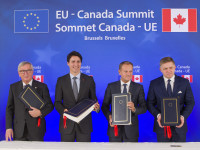Technology transfer in the university context has emerged as significant policy issue with governments seeking to maximize the benefits of public investment in research at Canadian universities. For example, the Ford government in Ontario recently launched an expert panel on intellectual property squarely focused on the issue that speaks to maximizing commercialization opportunities with an emphasis on intellectual property. But what if maximizing commercialization opportunities does not mean prioritizing patents? Professor Richard Gold from McGill University’s Faculty of Law argues that universities should get out of the patenting game. He joins me on the Lawbytes podcast this week to discuss the failure of patent first strategies and why open science may offer a better path for commercialization success.
Post Tagged with: "patents"
Bursting the IP Trade Bubble: Canada’s Position on IP Rules Takes Shape With Suspended TPP Provisions
In the months following the conclusion of the Trans Pacific Partnership, critics pointed to many specific problems in the text with respect to intellectual property, culture, privacy, and dispute resolution. TPP defenders consistently dismissed those concerns, yet last week’s successful Canadian demand to suspend many of the most problematic IP provisions (along with holding out for reforms to the cultural exemption) confirms that the government has recognized the validity of the criticisms. The government may yet cave to U.S. pressure in the NAFTA renegotiation, but it has established a clear position on culture and IP that better reflects the national interest.
The TPP is Back: My Submission on the Canadian Government’s TPP11 Consultation
The Trans Pacific Partnership, once left for dead after U.S. President Donald Trump withdrew from the agreement, is back with negotiations on a TPP11 (the original agreement featured 12 countries) set to resume next week. With reports indicating that dozens of provisions may be suspended, the Canadian government just concluded a public consultation on the issue. My full submission is posted below. It expresses concern with the lack of TPP transparency and provides comments on five substantive areas: dispute settlement, copyright, patents, e-commerce/digital trade, and culture.
Just Passing Through: Why Canadian Anti-Counterfeiting Law Should Not Permit In-Transit Shipment Searches
As Canadian officials prepare for the forthcoming NAFTA renegotiation, changes to Canada’s border measures provisions seem likely to surface as a U.S. demand. Late last month, the USTR released its annual Special 301 report and the issue of Canadian anti-counterfeiting law – in particular, the absence of provisions to allow for the search of in-transit shipments that are not bound for Canada – topped the list of concerns. The U.S. report states:
The United States remains deeply concerned that Canada does not provide customs officials with the ability to detain, seize, and destroy pirated and counterfeit goods that are moving in transit or are transshipped through Canada. As a result, the United States strongly urges Canada to provide its customs officials with full ex officio authority to address the serious problem of pirated and counterfeit goods entering our highly integrated supply chains.
The U.S. position has garnered some support in Canada. For example, a recent Globe and Mail editorial urged the government to change the 2014 anti-counterfeiting law by granting customs agents the power to search and seize shipments that are not bound for Canada.
CETA Implementation Bill Provides Reminder of the IP Cost in the Canada – EU Trade Deal
The Canadian government moved quickly from signing the trade agreement between Canada and the European Union on Sunday to tabling Bill C-30, the CETA implementing legislation, on Monday. While most of the attention has focused on the political issues surrounding CETA in Europe and the potential gains for Canadian exporters due to tariff reductions, the implementing bill provides a reminder that there are significant costs associated with CETA that have generated far less discussion. In fact, the majority of the 140-page bill features changes to Canada’s intellectual property rules, requiring changes that largely serve European interests.
Mandated reforms to patent protections (in the form of term restoration provisions) and the expansion of protections for dozens of European geographical indications was always part of the price to be paid for CETA. There were concerns expressed throughout the negotiations on both issues. Geographic indications rules grant protections to foods widely produced around the world and establish new marketing and naming restrictions on Canadian food producers. Meanwhile, the patent term restoration provisions are likely to increase health care costs in Canada by delaying the availability of generic pharmaceuticals due to the extension in the term of protection for patented pharmaceuticals.











